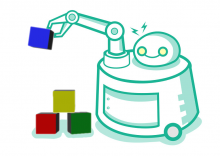| Title | Rapid trial-and-error learning with simulation supports flexible tool use and physical reasoning |
| Publication Type | Journal Article |
| Year of Publication | 2020 |
| Authors | Allen, K, Smith, KA, Tenenbaum, JB |
| Journal | Proceedings of the National Academy of Sciences |
| Pagination | 201912341 |
| Date Published | 11/2021 |
| ISSN | 0027-8424 |
| Keywords | intuitive physics, physical problem solving, tool use |
| Abstract | Many animals, and an increasing number of artificial agents, display sophisticated capabilities to perceive and manipulate objects. But human beings remain distinctive in their capacity for flexible, creative tool use—using objects in new ways to act on the world, achieve a goal, or solve a problem. To study this type of general physical problem solving, we introduce the Virtual Tools game. In this game, people solve a large range of challenging physical puzzles in just a handful of attempts. We propose that the flexibility of human physical problem solving rests on an ability to imagine the effects of hypothesized actions, while the efficiency of human search arises from rich action priors which are updated via observations of the world. We instantiate these components in the “sample, simulate, update” (SSUP) model and show that it captures human performance across 30 levels of the Virtual Tools game. More broadly, this model provides a mechanism for explaining how people condense general physical knowledge into actionable, task-specific plans to achieve flexible and efficient physical problem solving. |
| URL | http://www.pnas.org/lookup/doi/10.1073/pnas.1912341117 |
| DOI | 10.1073/pnas.1912341117 |
| Short Title | Proc Natl Acad Sci USA |
Associated Module:
CBMM Relationship:
- CBMM Funded


![Embedded thumbnail for Rapid trial-and-error learning with simulation supports flexible tool use and physical reasoning [video]](https://cbmm.mit.edu/sites/default/files/styles/youtube_thumbnail_220w/public/youtube/T0Ejs0dJFNc.jpg?itok=Fk7DDmNO)